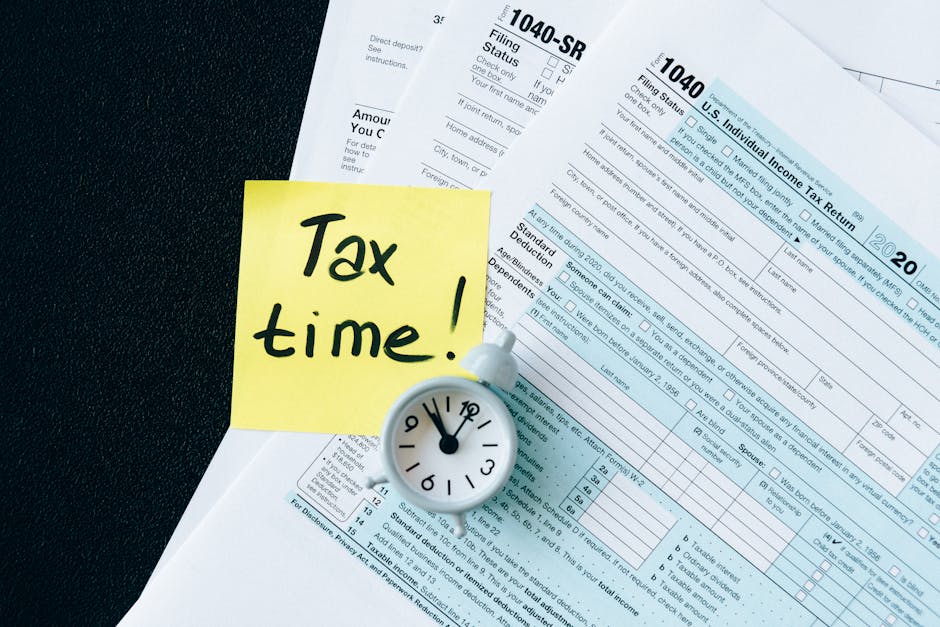Introduction
Tax season – two simple words that can induce a sense of apprehension in the hearts of individuals and business owners alike. It’s that time of year when we are required to scrutinize our income, calculate our obligations, and submit a report to Uncle Sam. This annual financial reckoning can be a daunting task, but ignoring it is not an option.
The relevance of tax season cannot be understated, especially in a society where fiscal responsibility forms a crucial part of citizenship. The aim of this season is to ensure everyone chips in their fair share to help run the nation. From road construction to education funding, tax contributions play a vital part. And whether you are a fresh employee or own a considerable business empire, tax season applies to all.
So why is preparing for tax season important? It’s simple – efficient tax preparation can save headaches, prevent penalties, and may even end up putting more money in your pocket. As Benjamin Franklin correctly noted, ‘In this world, nothing can be said to be certain, except death and taxes.’ Since we can’t avoid it, we might as well be ready for it.
The following sections of this article will guide you through the labyrinth of the tax season – from understanding tax deadlines to dealing with special tax circumstances. It’s designed to empower you with the knowledge you need to approach tax season with confidence and clarity. So, take a deep breath, keep calm, and read on. Because a prepared taxpayer is a confident taxpayer!

Understanding Tax Deadlines
To begin with, there’s a phrase known for its power in causing panic — “Tax Day”. Generally, in the U.S., April 15 holds the infamous title. However, it can fluctuate based on the year and any extensions provided by the IRS. This date signifies the deadline for filing annual income tax returns.
Understanding tax deadlines is crucial to avoid potential nightmares like penalties, fines, or interest on late payments. Furthermore, if you are expecting a refund, the sooner you file, the earlier you receive your returns.
There isn’t just one mighty tax deadline. If you are self-employed or have an estimated tax to pay, the fiscal year splits into quarters – April, June, Sept, and Jan of the following year. These are the dates by when your estimated payments should arrive at the IRS. Unemployment compensation recipients may also have quarterly tax payment obligations.
Don’t let the dates surprise you! Staying on top of these deadlines is key in this annual financial tug-of-war. You can accomplish this by marking your calendars or setting reminders on your smart devices.
If you work with a tax professional, they can be helpful in reminding you of upcoming deadlines. Additionally, there are tax apps and software that can automatically ping you when it’s time to prepare, pay, or file.
Remember, meeting tax deadlines is not just about avoiding unwanted penalties but also getting access to potential refunds faster. So, grab your calendar, some highlighters, and set your dates straight. The importance of planning for these deadlines really can’t be overstated. Plan and conquer the tax season like a truly savvy taxpayer!

Preparing Essential Tax Documents
With the dawn of tax season, it becomes necessary to summon the scattered documents that mirror your financial journey of the past year. The importance of gathering essential documents can’t be overstressed; it’s what stands between you and potential errors, penalties, and even audits. More importantly, it gives you a clear snapshot of your financial health.
Key documents come from various streams, which might be confusing for the uninitiated. Let’s break it down.
Income Documents
First on the horizon are your income documents.
- For Employees: The main document you’ll want to have on hand is your W-2. This comes from your employer and provides a comprehensive report of your earnings for the year, along with how much tax you’ve already paid.
- For Self-employed or Freelancers: Contractors should provide you with a 1099-NEC, detailing your earnings from them. Remember, you may have multiple 1099s, depending on the number of clients you’ve worked with. Additional forms in the 1099 family report different types of income, like interest from a savings account (1099-INT) or dividends from investments (1099-DIV).
- Government Payment Reports: Forms reporting unemployment income (1099-G) or social security benefits (SSA-1099) should be kept in mind. Tracking these documents will prevent any income details from being omitted during the tax filing process.
Expense Documents
Next, we have the category of expense documents.
- Tuition and Student Loan: For those with student loans or tuition expenses, forms 1098-E (Student Loan Interest) and 1098-T (Tuition Statement) are important.
- Charitable Contributions and Medical Bills: Keep your receipts for charity donations and medical bills if you plan to itemize deductions instead of taking the standard deduction. Even if you’re taking the standard deduction, some states allow itemized deductions on state-only returns.
Previous Year’s Tax Returns
Lastly, having your previous year’s tax returns can be a significant asset. These returns can serve as a roadmap for your current tax route, providing information like your adjusted gross income and itemized deductions.
Ultimately, a smoother tax prep season hinges on diligent and proper document preparation. Positioning these documents on your table will create a solid foundation for your tax filing process, preparing you for the battlefield of tax filing.

Practical Tips for Preparing for Tax Season
When it comes to tax season, no amount of planning can fully eradicate the stress associated with it, but there are certain practical steps you can undertake that can help massively streamline the process. These steps not only contribute to a more efficient tax filing experience, but they also save you significant time, and quite possibly, money.
One preliminary step to tackle is building a proactive habit of organizing your documents and receipts throughout the year — not just a hurried scramble when the deadline looms. Create a system where all your essential tax documents such as W-2, 1099, expense, and previous year’s tax forms are easily accessible. This could be as simple as a dedicated folder in your cabinet or a secure file on your computer.
Keeping abreast with tax law changes is another great habit. It’s not required that you become a tax law maestro overnight, but being aware of the basic changes such as alterations in tax rates, brackets, and deductions can allow for more informed decision-making and planning.
Making timely financial adjustments is pivotal. If you find that every tax season hits your bank account harder than you’d like, consider adjusting your withholding allowances. Tweaking your retirement contributions or other deductible expenses in accordance with your financial goals and tax liabilities can also greatly impact the total you owe.
But don’t just stop at prepping for the tax season. Use this period as a springboard to reassess your overall financial health. This could include adjusting your budget, setting financial goals, or even consulting with a financial advisor.
By taking these steps towards comprehensive and dedicated preparation, you can help alleviate the stress that comes from tax season. So, that daunting April deadline becomes less of a grim reaper and more of an administrative checkpoint on your personal financial journey.

Utilizing Tax Failing Software/Professionals
In this modern technologically advanced age, choices are abundant for filers when considering the method to prepare their taxes. Two of the most sought-after options include using tax filing software or hiring a tax professional. The decision often boils down to personal preference, the complexity of your tax situation, and financial considerations.
On one hand, tax filing software provides an easy and quick way to file your taxes. It’s designed to simplify the process by breaking it down into understandable steps. The software guides you through each section of the return, prompting you to input your financial data and it does all of the calculations for you, which is quite a relief to many. In terms of costs, it’s typically cheaper than hiring a professional, making it a favorite for those on tight budgets or dealing with straightforward finances.
Despite its convenience, tax filing software is not entirely flawless. It sometimes struggles to handle complex tax situations and its usefulness truly hinges on the user’s accuracy in providing information. Misinterpretations or lack of understanding can lead to costly errors. Additionally, while many software offer help options, they can’t quite match the personalized advice a human expert provides.
Hiring a tax professional, on the other hand, has its own set of advantages. Tax professionals have a deep understanding of tax laws and can leverage their experience to help you find specific deductions or credits you might otherwise overlook. For intricate tax situations – like owning a business, making substantial charitable contributions, or having significant investment income – a human touch can make a big difference. Of course, this service often comes at a higher price than software options, and the quality of service can vary depending on the professional you hire.
In conclusion, when choosing between software and a professional, consider the complexity of your tax situation, your budget, and how confident you feel about preparing your taxes. Remember, tax preparation is a means of ensuring you adhere to your civic duty and potentially maximize your refunds, so explore and choose what will make this annual routine as error-free and seamless as possible.

Overcoming Common Challenges in Tax Preparation
Successfully preparing your taxes can be a complex process, but segmenting the tax season into logical steps makes it more manageable. However, you are likely to encounter challenges along the way. Here, we’ll address some of these challenges and offer solutions.
Navigating Complex Tax Laws
One common challenge is the complexity of tax laws and codes. The consistent updates and revisions can make them difficult to navigate. To overcome this:
- Consider using tax software that updates annually with new regulations.
- Consult tax professionals who stay updated with changes.
- Use tools provided by the IRS like the comprehensive “Tax Guide for Individuals.”
Beating Procrastination
Procrastination can lead to errors and unnecessary stress. To avoid this, segment the tax preparation process into manageable tasks:
- Dedicate one week to gathering documents.
- Use the next week to review tax updates.
- Allocate another week for finalizing the filing.
This way, you can prevent burnout and improve the accuracy of your return.
Handling Missing or Lost Documents
Losing or misplacing important documents can be a significant roadblock. To prevent this, establish a centralized filing system for all financial, income, and expense reports. File tax-related information as it’s received to minimize chances of misplacing it during tax season.
Managing Fears about Owing Money
Many people fear that they might owe the IRS money. Remember, owing money on your tax return just means your withholdings and estimated tax payments were lower than your total tax for the year. Not a failure, just a miscalculation. To reduce anxiety, consider budgeting throughout the year for potential taxes owed.
In conclusion, while challenges might arise during tax preparation, recognizing and addressing them can help facilitate a smoother, less stressful tax season.

Dealing with Special Tax Circumstances
Tax season is often painted with a broad brush, but it’s important to note that everyone’s situation won’t fit neatly into the standard tax bracket. We’ve got some unique circumstances that can change how you approach the tax season. These nuances can range from self-employment, encountering large financial changes, inheriting estates, or even earning overseas income. Let’s break down some of these instances and give you some tips on how to handle them.
Self-employment, for example, throws a few curveballs into the tax lineup. You’re not only an employee; you’re also technically the employer, which changes the dynamics. Foremost, you’ll be dealing with self-employment tax, contributing to both Medicare and Social Security. Take note, though, there are several deductions available, like home office deductions and business expenses, that can significantly lessen your tax burden. It’s recommended to keep accurate, up-to-date records of all your business-related expenses and consult with a tax professional if needed.
Dealing with significant financial changes, like a bump in income, might also change your tax picture. If your income experiences a significant surge, you might find yourself propelled into a higher tax bracket. This higher taxable income might increase your tax bill or decrease your expected refund. If this happens, it’s important to review withholding amounts and possibly make estimated tax payments throughout the year to avoid a massive whopping tax bill come April.
Inheritance can often bring about special circumstances as well. If you inherit property, money, or other assets, you might have to pay inheritance or estate taxes. But the good news is that there are numerous exclusions and deductions available to lighten the load.
If you’re an American who earns an income overseas, you might be lamenting double taxation. Luckily, the US offers the Foreign Earned Income Exclusion to help you out. It’s a good idea to understand the taxation rules in your residential country and in the US to prevent running afoul of tax law and to maximize opportunities for credits and deductions.
These are just a few examples of unique tax situations. Each prompts different tax implications and requires different strategies. Therefore, understanding your personal circumstance, keeping accurate records, and consult with tax professionals when needed are crucial steps in navigating tax season. But worry not, with the right approach even special circumstances become manageable.

Section formatting failed

Section generation failed